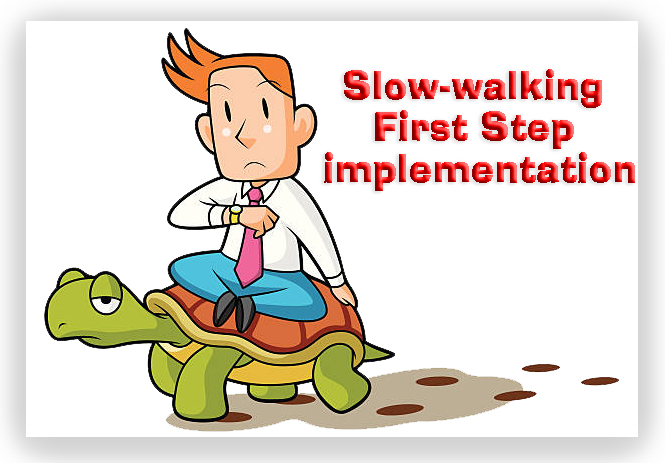We post news and comment on federal criminal justice issues, focused primarily on trial and post-conviction matters, legislative initiatives, and sentencing issues.

BOP IS RUNNING OUT THE CLOCK ON EARNED TIME CREDIT IMPLEMENTATION
 Criminal justice advocates and inmates alike cheered the passage of The First Step Act, legislation that (among other things) directed the Bureau of Prisons to grant earned-time credits to inmates who successfully complete evidence-based recidivism reduction programs (EBRRs) or so-called productive activities.
Criminal justice advocates and inmates alike cheered the passage of The First Step Act, legislation that (among other things) directed the Bureau of Prisons to grant earned-time credits to inmates who successfully complete evidence-based recidivism reduction programs (EBRRs) or so-called productive activities.
First Step made it sound like Christmas. When an inmate had completed 30 days of successful programming, he or she can get 10 to 15 days of credit, depending on PATTERN score. The credits can be used to increase the amount of time awarded for halfway house or increased home confinement at the end of a sentence. Up to 12 months of credits can be swapped for early release from custody, with the time added to supervised release.
But the devil’s in the details, and the BOP was quick to bedevil the earned-time credit program with those details. Inmates were buzzing at the of 2018 with visions of credit being awarded for programs in which they were already enrolled. Some thought that inmate employment as pedestrian as hallway orderly would qualify as a “productive activity.” Others were counting up the number of adult continuing education (ACE) classes they could take on topics as varied as creative writing or the plays of Shakespeare. Still others were figuring out how many courses they had completed prior to First Act passing, and wondering how to get retroactive credits for those.
 The first detail to smack inmates in the face was the effective date of the program. As soon as it was clear that nothing was happening right away, everyone started looking at July 2019, when the PATTERN program was unveiled, as the date before which no credits would be awarded. Then the start became January 2020, when PATTERN was adopted in final form, and the BOP rolled out its list of EBRR-qualifying programs (omitting most of the ACE programs people had anticipated would count toward credits) and limiting “productive activities” to a precious few.
The first detail to smack inmates in the face was the effective date of the program. As soon as it was clear that nothing was happening right away, everyone started looking at July 2019, when the PATTERN program was unveiled, as the date before which no credits would be awarded. Then the start became January 2020, when PATTERN was adopted in final form, and the BOP rolled out its list of EBRR-qualifying programs (omitting most of the ACE programs people had anticipated would count toward credits) and limiting “productive activities” to a precious few.
After January 2020, the BOP continued to deny credits to inmates. A few inmates have sued to have their credits awarded – starting with Rabbi Aryeh Goodman, an inmate at Fort Dix – seeking credits they said they had earned and demanding shortened prison sentences in the process. That was when some sharp-eyed analyst at the BOP argued that First Step did not require the award of any PATTERN earned credit until a two-year phase-in period under the statute has expired, which was January 15, 2022.
That argument got shot down. Courts have overwhelmingly found “no evidence in the statutory framework for delaying application of incentives earned by all prisoners during the phase-in program until January 15, 2022, the final date when BOP must complete the phase-in with respect to ‘all prisoners’.” (About the only inmate to lose this argument was former Trump lawyer Michael Cohen).
But the real detail – and the one that will gut the program like a fat carp – is First Step’s directive that credits be awarded “for every 30 days of successful participation in evidence-based recidivism reduction programming or productive activities.” What exactly is a “day?” The BOP has proposed adopting a rule that a “day of successful participation” means eight full hours of programming. That means that a full 240 hours of EBRR programming would be needed to earn 10 days of credit (15 days if you’re a low or minimum PATTERN).
 An inmate thus would have to program eight hours a day, five days a week, for years in order to earn the 12 months of credit that can be used to cut a year off of incarceration. This assumes that the inmate has no employment (but everyone does) and can schedule multiple programs efficiently, so that one starts as soon as another one ends. With mealtimes, recalls, counts, and callouts – all part of a federal inmate’s day – even an inmate without a job would be lucky to be able to string together six hours a day of time available for taking EBRRs, even if they were available.
An inmate thus would have to program eight hours a day, five days a week, for years in order to earn the 12 months of credit that can be used to cut a year off of incarceration. This assumes that the inmate has no employment (but everyone does) and can schedule multiple programs efficiently, so that one starts as soon as another one ends. With mealtimes, recalls, counts, and callouts – all part of a federal inmate’s day – even an inmate without a job would be lucky to be able to string together six hours a day of time available for taking EBRRs, even if they were available.
On top of all of that, with the BOP practicing augmentation (and with no end to the correctional officer shortage in sight), the availability of teachers on any given day is an open question.
The BOP published a proposed rule almost eleven months ago, on November 25, 2020, that would adopt the 8-hour-a-day “programming day” standard. Over 250 responses were received by the time the public comment period closed on January 25. But today, the BOP is extending even further the rulemaking proceeding, issuing a notice that “upon review of the comments, it is unclear to the Bureau whether commenters had fully considered the issue of whether DC Code offenders in BOP custody are eligible for time credits under 18 USC 3624(d)(4).”
The BOP complains that First Step is ambiguous on this point, going into detail in today’s notice on an issue it dismissed in the initial rulemaking proposal as contrary to the statute.
Who’s kidding whom? The public did not consider the issue because in the original rulemaking notice, the BOP wrote that “an inmate who is in the custody of the Bureau, but is serving a term of imprisonment for a conviction under the law of one of the fifty (50) states, the District of Columbia… or any other territory or possession of the United States is not an ‘eligible inmate’.”
 So, more than nine months after the comment period ending, the BOP has opened a further 30-day public comment period on the issue it rejected out of hand, and the public thus did not consider. After the additional period closes on November 18, the BOP will at some point issue a final rule. That will no doubt be on or right about January 15, 2022.
So, more than nine months after the comment period ending, the BOP has opened a further 30-day public comment period on the issue it rejected out of hand, and the public thus did not consider. After the additional period closes on November 18, the BOP will at some point issue a final rule. That will no doubt be on or right about January 15, 2022.
The BOP will have thus required 37 months to adopt draconian rules to implement First Step credits. And it will have run out the clock on its 3-year “phase-in” period.
Goodman v. Ortiz, Case No. 20-7582, 2020 U.S. Dist. LEXIS 153874 (D.N.J., Aug. 25, 2020)
Federal Register, FSA Time Credits, 85 FR 74268 (Nov. 25, 2020)
Federal Register, FSA Time Credits, 86 FR 57612 (Oct 18, 2021)
Reuters, U.S. Justice Dept clashes with inmates over credits to shave prison time (Aug 18)
– Thomas L. Root

